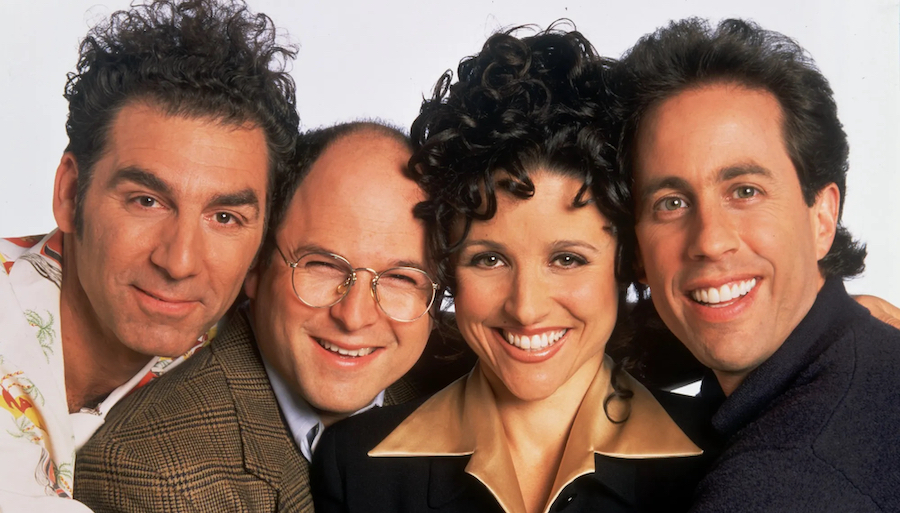ABOVE AVERAGE

The seminal TV show of the 1990s started out as nothing special at all. It was a show about nothing, but it quickly turned into something. Stand-up comedian Jerry Seinfeld built his entire act on those little things we all do every day, which may not strike you as funny until he makes you think about it. It was when he got together with Larry David, a cynical, grumpy comedian with Saturday Night Live experience, that Seinfeld struck gold.
Inventing three friends
The show they created for NBC featured Seinfeld as himself, a stand-up comedian in New York. Three friends were invented for him. One of them was based on David himself, a real estate agent named George Costanza (Jason Alexander) who had known Jerry since they were kids. Another character was Kramer (Michael Richards), Jerry’s eccentric neighbor, based on a real person named Kenny Kramer who lived in the same building as David. And then there was the woman whose job it was to bring a feminine touch to this group. Elaine Benes (Julia Louis-Dreyfus) was Jerry’s former girlfriend. After splitting up, the two of them had built a friendship unmoved by the parade of girlfriends and boyfriends who made appearances in one or a number of episodes and then were never seen again.
It didn’t take long to realize that there was something wrong with these people. They had a selfish streak and were unable to sustain romantic relationships; there was always some stupid reason to end them, because they tended to become obsessed by small things, failing to see the bigger picture. They were never truly happy, and perhaps audiences connected with that dark side. It was easy to empathize with (and see the comedy in) people who consistently failed to appreciate that life might be good if only they could ignore their personal bullshit.
Minor characters made an indelible mark
Kramer made Richards a big star and audiences loved his knack for physical comedy. But my favorite was George, this embodiment of Larry David. George would always find the glass half-empty. He also had a ruthless streak, taking advantage of anyone and anything if there was something to gain from it. A brilliant complement was introduced in the form of his parents; Jerry Stiller and Estelle Harris were absolutely hilarious, a constant source of embarrassment to a person who made sure everything was going against him.
Jerry’s character had his share of contradictions; here was a guy who could be equally callous as George, but also had a childish streak
Obviously, Seinfeld was no actor, but it was part of the fun, watching him just take in the rest of the cast as they were doing their thing, barely holding back laughter. His character had his share of contradictions; here was a guy who could be equally callous as George, but also had a childish streak, idolizing Superman and usually seen eating cereal out of a bowl.
Over the years, several other memorable characters appeared, some of them making an indelible mark. There’s the Soup Nazi and Babu with the Pakistani restaurant. There’s Susan whom George accidentally poisoned, and the Bubble Boy. And let’s not forget Newman, played by Wayne Knight, a cowardly, mean-spirited mailman who became Jerry’s nemesis.
The show remained bright and inventive throughout its run – and most importantly, very funny, even after David’s departure. It was a very New York kind of experience… but its success showed that perhaps there lives a cynical little New Yorker in a lot of people all over the world.
Seinfeld 1990-1998:U.S. 180 episodes. Color. Created by Jerry Seinfeld, Larry David. Theme: Jonathan Wolff. Cast: Jerry Seinfeld, Julia Louis-Dreyfus (Elaine Benes), Jason Alexander (George Costanza), Michael Richards (Cosmo Kramer), Wayne Knight (91-98).
Trivia: The original pilot episode aired in 1989.
Emmys: Outstanding Comedy Series 92-93; Writing 91-92, 92-93; Supporting Actor (Richards) 92-93, 93-94, 96-97; Supporting Actress (Louis-Dreyfus) 95-96. Golden Globes: Best Comedy Series 94; Actor (Seinfeld) 94; Actress (Louis-Dreyfus) 94.
Quote: “Do you ever get down on your knees and thank God you know me and have access to my dementia?” (Alexander to Seinfeld)
Last word: “Larry [David] runs into a guy like me who just expects to succeed at everything. There were two keys to the show. Our sense of humor is combustible together. There was no idea he would have that I couldn’t immediately get onto and say, ‘Yeah, then we’ll do that and then we’ll do that.’ We’re very combustible together. The other thing, equally as important to me, absolutely, if not more important, is we shared a relentless work ethic, both of us. There was no effort that was spared, no effort was too much, we were working Saturday, we were working Sunday, we were working Tuesday night… This thing is going to be right. This script is going to be right before we turn those cameras on. But he, of course, always expects disaster and I always expect glory.” (Seinfeld, Parade)
